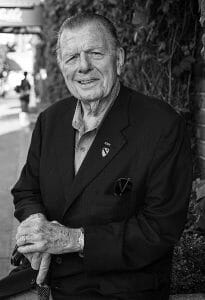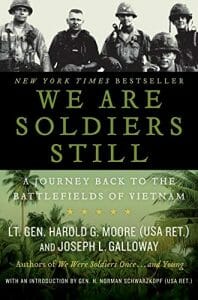Born in Texas, Galloway initially enrolled in community college after high school, but dropped out to join the Army. His mother convinced him to study journalism, and he did, but he mixed the two careers: he became a war correspondent with United Press International, and assigned to a “new” American war: Vietnam. His first battle was Ia Drang — the first major U.S./NVA fight. The Americans were heavily outnumbered by North Vietnamese troops, and the battle raged for three days with horrific losses on both sides. At one point Galloway, who was 24, witnessed an American soldier taking heavy wounds, and jumped in with an Army medic to save him. The medic was immediately shot and killed; Galloway kept going, and pulled Pfc. Jimmy Nakayama to safety. The soldier was helicoptered to a field hospital, but died two days later.

“What I saw and wrote about broke my heart a thousand times, but it also gave me the best and most loyal friends of my life,” Galloway said years later. “The soldiers accepted me as one of them, and I can think of no higher honor.” He had long thought about writing a book about the battle with U.S. battalion commander Lt. Gen. Harold G. Moore, but they had never gotten around to it. In 1980, Galloway was watching TV when he saw a segment about the war. “I found myself sitting in my chair, shaking like a leaf, with tears rolling down my cheeks at the sight and the memories,” he said. “I thought, you can run from it, and it will catch you and eat you, or you can face it. I picked up the phone the next morning and called General Moore at his home in Colorado. ‘Are you ready to start work on this book?’ He said, ‘I sure am.’” The result was We Were Soldiers Once…and Young* — which was made into the 2002 film We Were Soldiers, starring Mel Gibson as Gen. Moore, and Barry Pepper as Galloway. (Galloway figured in other films: he was played by Tommy Lee Jones in 2017’s Shock and Awe, and Edward Burns in the miniseries Vietnam in 3D.) As for Galloway’s book, written with Gen. Moore, it is “a car crash of a book,” said war correspondent Nicholas Proffitt in a review for the New York Times. “You are horrified by what you’re seeing, but you can’t take your eyes off it.” The research and writing took 10 years, because they wanted to conduct interviews to illustrate every possible angle, from Vietnamese commanders to other veterans.

After Vietnam, Galloway served as the UPI bureau chief or regional manager in Tokyo, Jakarta, New Delhi, Singapore, Moscow, and Los Angeles, and was a weekly columnist for McClatchy Newspapers. He also covered the 1971 war between India and Pakistan and the 1991 Persian Gulf War; from the latter, Gen. H. Norman Schwarzkopf called Galloway “the finest combat correspondent of our generation — a soldiers’ reporter and a soldiers’ friend.” When Galloway retired in January 2010, he wrote that “I have loved being a reporter; loved it when we got it right; understood it when we got it wrong. In the end, it all comes down to the people, both those you cover and those you work for, with or alongside during 50 years.” In 1998, Galloway was awarded the Bronze Star (with Valor) by the U.S. Army for his actions in rescuing Pfc. Nakayama. “He was a soldier in spirit, he was a soldier in actions, and he was a soldier in deeds,” said Maj. Gen. Joseph K. Kellogg at the ceremony. “I accept it,” Galloway replied, “in memory of the 70-plus reporters and photographers who were killed covering the Vietnam War, trying to tell the truth and keep the country free.” Joseph L. “Joe” Galloway retired to Concord, N.C., and died in a hospital there on August 18, after a heart attack. He was 79.
